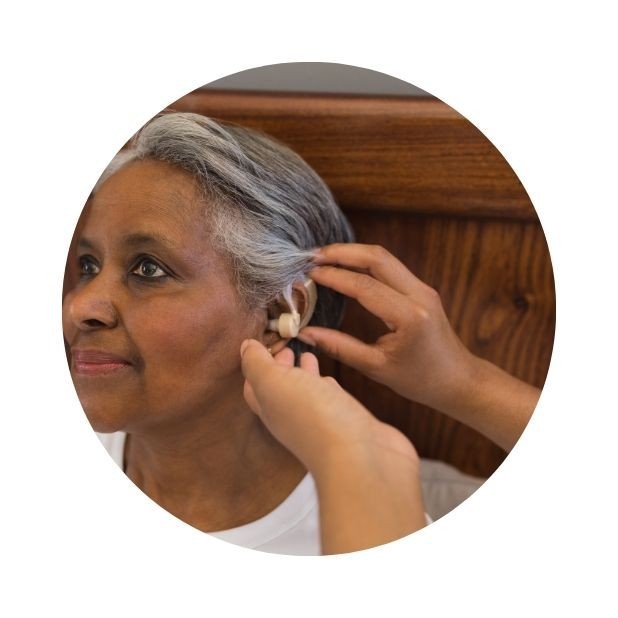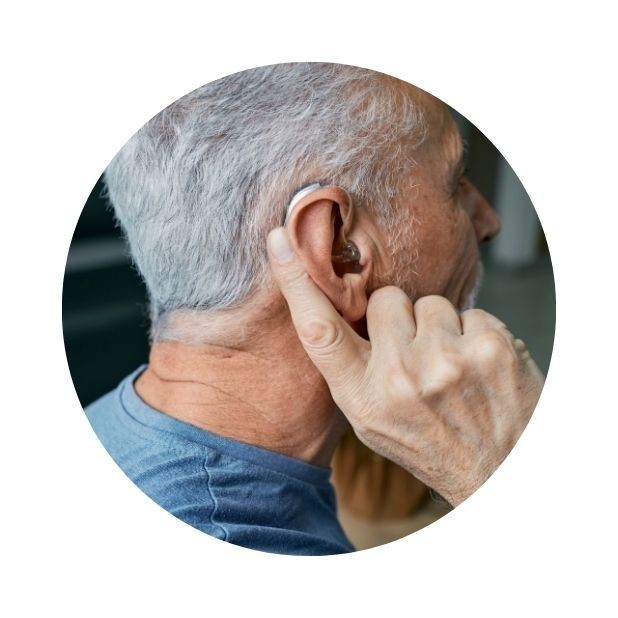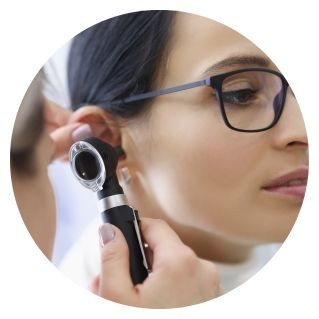Free home visits
with a local audiologist
Last Hearing Aid UK Update: 17
At-home hearing tests offer comfort, privacy, and flexibility, allowing you to assess your hearing on your own schedule without the need for travel or appointments.
They are often cost-effective and provide instant results, making them accessible for those with mobility issues or living in remote areas. This approach simplifies monitoring your hearing health on your terms. In today’s busy world, the ability to have a hearing test at home means you no longer have to worry about travel, waiting rooms, or clinic queues.
On this page, we will be answering questions such as 'What should I expect from a hearing test at home?', 'Are hearing tests accurate?', 'What is an audiogram?' or maybe you might be questioning the current online hearing tests, and if they give you an accurate result.

Wherever you live in the UK, we will have around 2-3 audiologists who are local to you who can come and visit you at home.
They will be able to carry out a thorough professional hearing healthcare check and test, using the latest equipment, and all in the comfort of your own home.
You'd be surprised to know that not all hearing healthcare providers can offer at-home hearing tests, even though there are many benefits to hearing tests and other hearing healthcare services at home.
It's important to choose a provider who truly understands the importance of home hearing services, not just for convenience, but for the deeper, more personal care it allows.

Your family or friends can also be with you for support and to ease the burden of decision-making and understanding important information.
Our home hearing tests are a free and convenient way to receive excellent customer hearing healthcare at a time that suits you and your lifestyle, and from a company that you can trust.
All our audiologists will offer support, advice, and hearing solutions that are as unique as your hearing loss and plan your future care.
Whether it’s your first hearing test or a follow-up, our team will provide clear explanations and honest advice with no jargon, just straightforward support.

Hearing Aid UK can provide you with a home hearing test that is not only professional and thorough but also carried out using computerised equipment comprising the latest technology.
This way, you always gain from an accurate audiogram, which will result in the most beneficial hearing aids for you and your lifestyle.
Our audiologists are equipped with state-of-the-art portable tools, so nothing is compromised. You’ll receive the same high standard of care as in a traditional clinic.

We offer hearing tests at home for the elderly in the UK, either at their home or within a nursing home environment. They are generally carried out the same way as any other. The only difference is that you might want a member of your family or a friend to be there for support or to help relay personal information, take in audiology information, or make future decisions.
If you do live in an assisted living accommodation and you want to book a hearing test, you will need to let the management of the facility know of the visit. Other than that, it is the same process as any other home hearing test.
We understand how important it is to feel safe and supported, especially for older adults. Our team takes extra care to ensure the process is relaxed, familiar, and tailored to each individual’s needs.
In the past, Age UK referred their customers for their hearing healthcare to Claritas for services such as hearing tests, hearing aids, and hearing healthcare going forward. Then Claritas went into administration in 2018, and now Amplifon has taken over this role, as well as the administrator.
However, from experience, some customers have been unsuccessful with their transition to Amplifon for various reasons. If this is the case for you, we can take care of you and your healthcare in the future.

Quite a lot of people we speak to think that home hearing tests or audiograms are not as accurate as those operated in clinics. In short, this is not true.
In fact, it is the most realistic place to record your hearing ability, as it's in your own environment with the sounds you hear and acknowledge every day.
It is also the best atmosphere to program your hearing aids in, as this is naturally the place where you will spend most of your time.
Our audiologists take all the professional equipment they use in their own practices and clinics. The equipment they use is both professional and accurate.
Ultimately, it results in you receiving the right hearing loss diagnosis and hearing solution for your wants and needs.
Your home is where life happens - background sounds, daily conversations, and the TV.
That’s why testing and fitting hearing aids in this setting often leads to better long-term outcomes.
During the last two years, online hearing tests have become more popular.
They are not accurate or a professional evaluation of your hearing, but they can give you a basic overview of your current hearing state.
This also means that they are incapable of providing a medical or audiological diagnosis, or even the cause of any hearing loss.
This is what an audiogram or hearing test with your audiologist would read and evaluate precisely.
To put it simply, an audiogram is a graph that shows the results of your hearing limitations and capabilities by completing a series of tests.
It is still the most accurate way of analysing your hearing capabilities and, if needed, help find the most beneficial hearing solution.
Online tests are a good starting point, but they don’t replace the expertise of a qualified audiologist or the accuracy of calibrated equipment.
Due to this company's growth and marketing strategy, along with the industry's growth, Boots Hearingcare can only provide in-store appointments for hearing tests.
Specsavers Hearcare does provide a hearing test at home, but this will not be a free service.
We are not sure whether this service stretches to aftercare needs such as hearing aid maintenance and adjustments.
Just like Hidden Hearing, Bloom Hearing Services can see their patients at home for services such as hearing tests for no extra fee.
Although Amplifon can do a hearing test at your home, they don't offer a nationwide service, so always check with their audiologist before you commit to an appointment.
Due to this company being on a small scale, Scrivens cannot currently cater to their patients at home; however, this might change in the future.
This is a large company, and therefore, Hidden Hearing can visit their patients at home at no additional charge. However, always check with their audiologist before you commit to an appointment.

Advancements in technology have made it possible for hearing tests to be conducted conveniently at home. Here are the main advantages of hearing tests at home:
One of the most significant advantages of at-home hearing tests is the comfort and convenience they offer.
Instead of scheduling an appointment and travelling to a clinic, individuals can now monitor their hearing health from the comfort of their own homes.
Some people may feel uncomfortable or self-conscious about discussing their hearing concerns in a clinical setting.
Hearing tests at home provide a private and confidential environment, allowing individuals to take the test at their own pace, without worrying about judgment or stigma.

Another advantage of at-home hearing tests is the increased accessibility they provide.
This is particularly beneficial for those living in remote areas or those with mobility challenges, making it difficult to access healthcare facilities.
By eliminating the need to travel, at-home hearing tests ensure that everyone, regardless of location or physical limitations, can monitor their hearing health conveniently.
Conducting hearing tests at home empowers those with hearing loss to take control of their own hearing health.
We have over two hundred audiologists in the UK, which means we have 2-3 in your area.
Whether you think your hearing has changed or are concerned about a loved one's hearing, we can visit you at home or in a care home environment.

There are many benefits to having a hearing test or other hearing healthcare services at home. In fact, around 90% of our patients prefer to be seen at home.
Some of the reasons are due to poor health, being housebound, having logistical issues, or simply finding it more convenient for them.
Before your ear examination, the audiologist will first ask you a series of questions to better understand your current health, family medical history, and any specific worries and problems with your hearing. The amount of information given is paramount to how they can help you and determine the right hearing solution for you.
Our professional audiologists will chat with you about any health concerns or issues and generally put your mind at ease. Remember that everything discussed is completely confidential.
The audiologist will begin examining your inner ear canal and outer ear with an otoscope, which visibly shows the general health of your ear and if anything might be obstructing your hearing, like earwax.
Then your hearing test (or audiogram) will begin. The audiometer will be used to record various measurements that display your current level of hearing.
These audiogram recordings will discover whether you have a hearing loss and ultimately diagnose the best hearing solution for your loss, help to address any issues and assist any future audiology plans. Or you may need to be referred to an ENT specialist or GP for other treatment and examinations.
The audiogram may seem a little overcomplicated at first, but your audiologist will go through every step and explain why each step is necessary, so you will always be in the know and aware of the process as it is happening.
If a hearing aid is needed, your audiologist will go through all the hearing devices that would be beneficial for your hearing loss, lifestyle, budget, dexterity needs, technical needs, and connectivity required.
They will fit them for you at home and adjust the device in many different ways so you get the most out of them and experience the best sound possible. All hearing loss is different, and it must be tailored to your specific needs.
At Hearing Aid UK, we offer free, professional hearing tests conducted in the comfort and privacy of your own home. Our qualified audiologists use the latest technology to provide accurate, personalised assessments tailored to your lifestyle and hearing needs.
Home testing is ideal for those with mobility issues, busy schedules, or who prefer a more relaxed environment. It offers convenience, confidentiality, and real-world results, helping you take control of your hearing health with trusted, expert support, wherever you live in the UK.
Our audiologists come to you with the latest equipment with no appointments, no queues, just expert care where you feel most comfortable.
►Click here to go to our free hearing tests at home
►Click here to go to hearing tests at home for the elderly
►Click here to go to who does hearing aid tests at home in the UK?
Do not spend hundreds of pounds without getting a second opinion from us.
 Not only are the prices great, but the service is fantastic! Many thanks to your team.
Not only are the prices great, but the service is fantastic! Many thanks to your team.Can I get a free home hearing test? Our home hearing tests are a free and convenient way to receive excellent customer hearing healthcare at a time that suits you and your lifestyle - from a company that you can trust.
Do audiologists visit care homes? Of course! If you do live in assisted living accommodation and you want to book a hearing test - you will need to let the management of the facility be aware of the visit. Other than that it is the same process as any other home hearing test.
In fact, it is the most realistic place to record your hearing ability, as it's in your own environment with the sounds you hear and acknowledge every day. It is also the best atmosphere to program your hearing aids in, as this is naturally the place where you will spend most of your time in.
In general, any audiologist will always recommend to you the hearing aid model that best suits your needs. Here is a useful checklist to make sure that is the case.
If you have significant hearing loss in both ears, you should be wearing two hearing aids. Here are the audiological reasons why:
Localisation: The brain decodes information from both ears and compares and contrasts them. By analysing the minuscule time delays as well as the difference in the loudness of each sound reaching the ears, the person is able to accurately locate a sound source.
Simply put, if you have better hearing on one side than the other, you can't accurately tell what direction sounds are coming from.
Less amplification is required: A phenomenon known as “binaural summation” means that the hearing aids can be set at a lower and more natural volume setting than if you wore only one hearing aid.
Head shadow effect: High frequencies, the part of your hearing that gives clarity and meaning to speech sounds, cannot bend around your head. Only low frequencies can. Therefore, if someone is talking on your unaided side, you are likely to hear that they are speaking, but be unable to tell what they have said.
Noise reduction: The brain has its own built-in noise reduction, which is only really effective when it is receiving information from both ears. If only one ear is aided, even with the best hearing aid in the world, it will be difficult for you to hear in background noise as your brain is trying to retain all of the sounds (including background noise) rather than filtering them out.
Sound quality: We are designed to hear in stereo. Only hearing from one side sounds a lot less natural to us.
Fancy some further reading on this topic? You can read about why two hearing aids are better than one in our article, hearing aids for Both Ears, here
For most people, the main benefit of a rechargeable hearing aid is simple convenience. We are used to plugging in our phones and other devices overnight for them to charge up. Here are some other pros and cons:
For anybody with poor dexterity or issues with their fingers, having a rechargeable aid makes a huge difference, as normal hearing aid batteries are quite small and some people find them fiddly to change.
One downside is that if you forget to charge your hearing aid, then it is a problem that can't be instantly fixed. For most, a 30-minute charge will get you at least two or three hours of hearing, but if you are the type of person who is likely to forget to plug them in regularly, then you're probably better off with standard batteries.
Rechargeable aids are also a little bit bigger and are only available in Behind-the-Ear models.
Finally, just like with a mobile phone, the amount of charge you get on day one is not going to be the same as you get a few years down the line. Be sure to ask what the policy is with the manufacturer's warranty when it comes to replacing the battery.
For most people, the answer is yes. But it's never that simple.
The majority of hearing problems affect the high frequencies a lot more than the low ones. Therefore, open fitting hearing aids sound a lot more natural and ones that block your ears up can make your own voice sound like you are talking with your head in a bucket. Therefore, in-ear aids tend to be less natural.
However, the true answer is we can't tell until we have had a look in your ears to assess the size of your ear canal, and until we have tested your hearing to see which frequencies are being affected.
People with wider ear canals tend to have more flexibility, also there are open fitting modular CIC hearing aids now that do not block your ears.
There is also the age-old rule to consider, that a hearing aid will not help you if it's sat in the drawer gathering dust. If the only hearing aid you would be happy wearing is one that people can't see, then that's what you should get.
Most people can adapt to any type of hearing aid, as long as they know what to expect. Have an honest conversation with your audiologist as to what your needs are.
Generally speaking, six or more. Unless it's none at all. The number of channels a hearing aid has is often a simplistic way an audiologist will use to explain why one hearing aid is better than another, but channels are complex, and it is really not that straightforward. Here are some reasons why:
Hearing aids amplify sounds of different frequencies by different amounts. Most people have lost more high frequencies than low, and therefore need more amplification in the high frequencies. The range of sounds you hear is split into frequency bands or channels, and the hearing aids are set to provide the right amount of hearing at each frequency level.
Less than six channels, and this cannot be done with much accuracy, so six is the magic number. However, a six-channel aid is typically very basic with few other features and is suitable only for hearing a single speaker in a quiet room. The number of channels is not what you should be looking at; it's more the rest of the technology that comes with them.
As a final note, different manufacturers have different approaches. One method is not necessarily better than any other. For example, some manufacturers have as many as 64 channels in their top aids. Most tend to have between 17 and 20. One manufacturer has no channels at all.
Manufacturer's warranties typically last between 2-5 years, depending on the brand and model, and cover defects in materials and workmanship. This includes repairs for component failures, electronic malfunctions, and manufacturing defects, but excludes damage from misuse, accidents, or normal wear. Most manufacturers also include loss and damage insurance for the first year.
We handle all warranty claims on your behalf, liaising with manufacturers and ensuring you get replacement devices quickly when needed. This comprehensive warranty coverage, combined with our lifetime aftercare, gives you complete peace of mind.
Our hearing tests are completely free, whether at our clinics or in your home. Unlike other providers who charge £30-£100 for home visits, we believe hearing healthcare should be accessible without financial barriers. Our comprehensive assessments include examination by a registered audiologist, audiogram results, and personalised recommendations.
All testing, future adjustments, and ongoing support are included at no extra cost. While NHS tests are also free, typical 6-week waiting periods often lead people to seek immediate private testing. We provide prompt, professional assessments that fit your schedule and budget.
Yes, we offer completely free home visits throughout the UK, and this service is included in our prices with no additional charges. Home visits are particularly valuable for people with mobility issues, busy schedules, or those who simply prefer the comfort and convenience of their own environment.
Our audiologists can conduct full hearing tests, fit hearing aids, and provide ongoing support in your home. This service sets us apart from many providers who either don't offer home visits or charge extra for them.
We can offer prices up to 40% lower than high street retailers because of our business model. As a network of 200+ independent audiologists, we don't have the massive overheads of large retail chains - no expensive high street premises, no sales targets pushing audiologists to sell the most expensive options, and no costly marketing campaigns.
However, we maintain the same buying power as the big chains because we purchase on behalf of our entire nationwide network. This means you get access to the same premium hearing aids with professional service, but at genuinely competitive prices.
We offer a comprehensive 60-day money-back guarantee, which gives you twice the industry standard time to properly assess whether your hearing aids are right for you. This extended period recognises that adjusting to hearing aids takes time, and your brain needs several weeks to adapt to the amplified sounds.
Unlike many providers who offer just 30 days, we believe 60 days gives you the confidence to test your hearing aids in all the situations that matter to you - from quiet conversations at home to busy restaurants and outdoor activities.
When we refer to a product as 'Latest Launch', we mean it is the latest to be released on the market.
When we refer to a product as 'New', we mean that the product is the newest hearing aid model on the market.
When we refer to a product as 'Superseded', we mean that there is a newer range available which replaces and improves on this product.
When we refer to a product as an 'Older Model', we mean that it is has been superseded by at least two more recent hearing aid ranges.